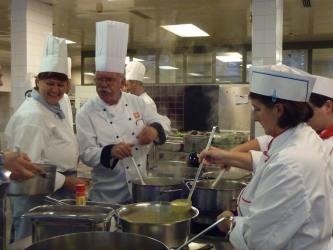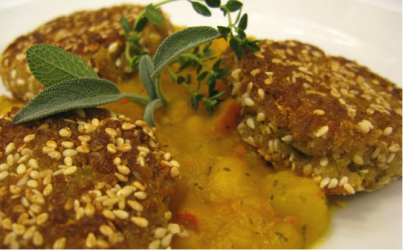Naturally good plate / Natürlich gut Teller, Vienna
May 28, 2013
Contributor: Vienna
Workshop:
Governance, synergies and local systems / Canteen – Restaurant – Final consumers: General Public
Resource efficiency – CO2 reduction / State of the art – Assessing the footprint of a meal/urban food demand – What food purchasing criteria to effectively lessen footprint?
Environmentally friendly and healthy meals are clearly labelled on menus and at buffets. Organic, seasonal, less meat and sustainable fish are the criteria that have to be fulfilled
“ÖkoKauf Wien” (EcoBuy Vienna, www.oekokauf.wien.at) is the programme for sustainable public procurement of the Vienna City Administration. Goods and services are bought according to ecological considerations, that are defined in eco-criteria and guide-lines. By executive decree they are binding for all departments of the Vienna City Administration. In a special working group criteria are developed to reduce the environmental impacts of food and drink, like CO2-emissions, the consumption of resources and to foster the quality and positive effects on health. In municipal hospitals and residential homes for retired people the City of Vienna is responsible for the supply with food and drinks of thousands of people. The naturally good plate has been created to meet the following demands: at least 1 component from organic farming, vegetables and fruits should be from the season, less meat, if used it must be from ethical husbandry, fish has to be from organic or sustainable fish farming. There are 6 further criteria of which 2 should be implemented: 2 thirds of the meal have to consist of vegetable components, the ingredients should be to 1 third of regional origin, 1 component fair trade, no use of convenience products, little packaging and innovative cooking. Every kitchen of the Viennese retirement houses offers the naturally good plate 3-4 times a week and in some of the hospitals and one canteen it is offered too. The plan is to find more partners.
The benefits are awareness of the impacts of food to the environment, healthy and new meals for patients, retired people and the own staff. There is less environmental impact and positive development for providers with regional goods, production is cheaper to some extent (more seasonal vegetables and fruits) but on the other side there is little choice in winter and certain components cannot be used.
Lessons learned: Such a project is a challenge as regards content as well as communication. Especially older people shouldn´t get the feeling that the new recipes remind them of poor times but of the food in their youth. It is very important first to convince the chef because they will face a certain modification effort.
Are there similar projects in other cities with experience in the modification of meals to regional and seasonal and the reduction of meat or transferring such an idea to restaurants?

